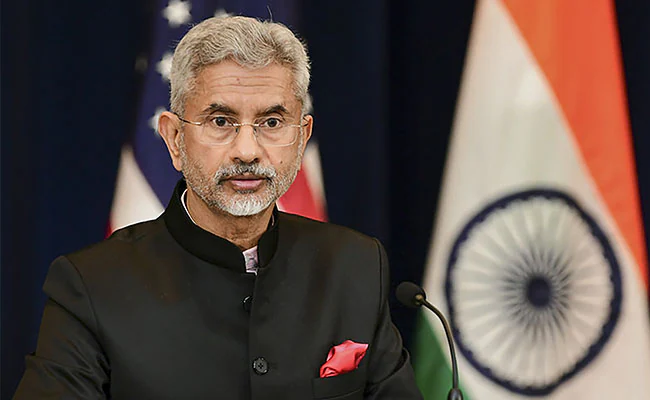Jaishankar says ‘state of border’ will determine state of India-China ties

The state of the border will determine the state of the relationship between Beijing and New Delhi, said India’s External Affairs Minister S Jaishankar.
Speaking at the launch of the Asia Society Policy Institute in New Delhi on Monday, he said that much of Asia’s future depends on how the ties between the two countries develop in the foreseeable future.
“Much of the future of Asia depends on how relations between India and China develop in the foreseeable future. For ties to return to a positive trajectory and remain sustainable, they must be based on the three mutuals: mutual sensitivity, mutual respect and mutual interest. Their current status is, of course, well known to all of you. I can only reiterate that the state of the border will determine the state of the relationship,” Jaishankar said.
Both India and China have engaged in a standoff at a number of friction points in eastern Ladakh for over two years. The situation worsened after violent clashes with Chinese troops in Galwan Valley in June 2020. Since then, both sides have been engaged in several high-level military talks.
“Asia’s prospects and challenges are today very much dependent on developments in the Indo-Pacific. In fact, the concept itself is a reflection of divided Asia, as some have a vested interest in keeping the region less cohesive and interactive. That the global commons and the international community are better served by collaborative endeavours like the Quad apparently leaves them cold. Developing even a basic strategic consensus in Asia is, therefore, clearly a formidable task. As the international order evolves, this desire to selectively retain elements of the 1945 situation while transforming others – and we see that in the UN as well – complicates world politics,” Jaishankar further said.
He also emphasized that a narrow Asian chauvinism is actually against the continent’s own interest. “Precisely because Asia is so energetic and creative, it would like to benefit from the open doors of other regions. That obviously cannot be a one-way street,” he added.
Jaishankar also said that the “three shocks” of COVID-19 pandemic, Ukraine conflict and climatic disturbances are also impacting the evolution of the Asian economy.
“Together, they make a powerful case for more engines of growth and resilient and reliable supply chains. There is a parallel debate underway in the digital world that focuses around trust and transparency. How these will translate into strategic outcomes is still too early to predict,” he asserted in the meeting.
Jaishankar also emphasized the contribution that rising Asia can make to the world order.
“As the most dynamic region beyond the West, its successes can inspire the rest of the Global South. Indeed, it is leading the process of global rebalancing through its endeavours. For this to have the widest impact, India espouses a cooperative, inclusive and consultative approach to international relations. We believe that multipolarity, rebalancing, fairer globalization and reformed multilateralism are all advanced by the progress of Asia. Our diplomacy is accordingly shaped by this belief,” the Indian Minister stated.###.
- Beijing News Net
-
Book Shelf
-
 Book Review
DESTINY OF A DYSFUNCTIONAL NUCLEAR STATE
Book Review
DESTINY OF A DYSFUNCTIONAL NUCLEAR STATE
- Book ReviewChina FO Presser Where is the fountainhead of jihad?
- Book ReviewNews Pak Syndrome bedevils Indo-Bangla ties
- Book Review Understanding Vedic Equality….: Book Review
- Book Review Buddhism Made Easy: Book Review
- Book ReviewNews Elegant Summary Of Krishnamurti’s teachings
- Book Review Review: Perspectives: The Timeless Way of Wisdom
- Book ReviewNews Rituals too a world of Rhythm
- Book Review Marx After Marxism
- Book Review John Updike’s Terrorist – a review
-
-
Recent Top Post
-
 Commentaries
Impasse over BRI Projects in Nepal
Commentaries
Impasse over BRI Projects in Nepal
-
 CommentariesNews
Yet another Musical Chairs in Kathmandu
CommentariesNews
Yet another Musical Chairs in Kathmandu
-
 CommentariesTop Story
Spurt in Anti-India Activities in Canada
CommentariesTop Story
Spurt in Anti-India Activities in Canada
-
 NewsTop Story
Nepal: Political Stability Under Threat Again
NewsTop Story
Nepal: Political Stability Under Threat Again
-
 NewsTop Story
Accountability Tryst With 2024 Ballot….
NewsTop Story
Accountability Tryst With 2024 Ballot….
-
 NewsTop Story
What Would “Total Victory” Mean in Gaza?
NewsTop Story
What Would “Total Victory” Mean in Gaza?
-
 CommentariesTop Story
The Occupation of Territory in War
CommentariesTop Story
The Occupation of Territory in War
-
 CommentariesTop Story
Pakistan: Infighting in ruling elite intensifies following shock election result
CommentariesTop Story
Pakistan: Infighting in ruling elite intensifies following shock election result
-
 CommentariesTop Story
Proforma Polls in Pakistan Today
CommentariesTop Story
Proforma Polls in Pakistan Today
-
 CommentariesTop Story
Global South Dithering Away from BRI
CommentariesTop Story
Global South Dithering Away from BRI
-
AdSense code



















